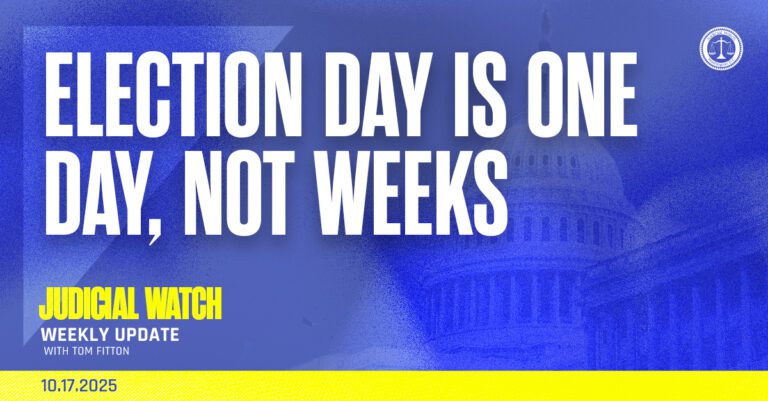Tom Fitton’s Judicial Watch Weekly Update
|
October 17, 2025

The Supreme Court Must End Illegal Vote Counting
Judicial Watch Sues CIA for Jeffrey Epstein Records
Judge Rules Prison Must Grant Sex-Change Surgery for Serial Child Molester
The Supreme Court Must End Illegal Vote Counting
In my op-ed for The Washington Times this week, I write that ballot tallying must conclude on Election Day:
Under federal law, Election Day in the United States is not two days, two weeks or two months. It is a single day. That anyone might insist otherwise is difficult to imagine.
Last week, the Supreme Court heard oral arguments in Bost v. Illinois State Board of Elections, a case challenging Illinois’ decision to count mail-in-ballots that arrive up to 14 days after Election Day. For 180 years, Election Day has been held on the same day in November. This date has been repeatedly reaffirmed by Congress and solidified into U.S. law. Yet in 2005, in flagrant violation of that law, Illinois began permitting the counting of mail-in ballots received up to 14 days after Election Day.
It should be deeply concerning that in 2020 alone, Illinois received 4.4% of votes from November 3 to November 17, after Election Day.
Fortunately, U.S. Rep. Mike Bost of Illinois and two Republican state presidential electors decided to challenge this policy in the courts, represented by my organization, Judicial Watch. They began by suing Illinois in May 2022.
Their case should have been easy to decide, but shockingly, the U.S. District Court for the Northern District of Illinois and the 7th U.S. Circuit Court of Appeals ruled that neither Mr. Bost nor the electors had “standing” to bring the lawsuit. In short, the courts refused even to permit the plaintiffs a chance to challenge the counting of late ballots in court.
That question has reached the Supreme Court, and the justices showed serious skepticism toward Illinois’ defense.
Chief Justice John G. Roberts Jr. questioned whether the state’s position would force courts to step into election disputes “at the most fraught time” in electoral politics. He pressed the Illinois solicitor general on why a candidate should have to wait until an election’s outcome is uncertain to challenge an unlawful rule.
Justice Brett M. Kavanaugh added that such a theory “depends on prognostication,” not law. Justice Neil M. Gorsuch warned that it would be “unseemly” for courts to predict a candidate’s chances of winning, a process that “itself might influence the election.”
As Judicial Watch attorney Paul Clement argued to the judges, “candidates have standing to challenge the rules that govern the election.”
Spending additional money and time to deal with illicit vote counting should be more than enough to give a candidate his day in court. Allowing late ballots to be counted extends Election Day for weeks and imposes significant and burdensome costs on candidates, who will be forced to extend campaigns well beyond the usual time frame. Candidates will also be required to foot the bill for representatives to oversee the counting of late-arriving ballots.
Voters rightly expect prompt results after the democratic process of casting ballots. Voter confidence in election outcomes suffers when winners and losers are not promptly announced. If Americans do not have confidence in the results of our elections, our entire system of government is imperiled. The court’s decision in Bost will determine whether candidates, those directly governed by election rules, can defend the rule of law before Election Day chaos unfolds.
If the justices rule for Mr. Bost, lower courts will finally have to judge Illinois’ 14-day counting window against the federal statute requiring a single, uniform Election Day. That could set a nationwide precedent, restoring the integrity of vote counting in every state.
We should hear [very soon] whether the Supreme Court will take up a Mississippi case where the 5th U.S. Circuit Court of Appeals ruled that Mississippi cannot count ballots after Election Day.
All Americans deserve a system of integrity and transparency, not one that invites fraud and election rigging. The 5th Circuit has already agreed with Judicial Watch that counting ballots even five days after Election Day is unlawful. If the Supreme Court now confirms that principle and rules in our clients’ favor, we like the odds of ending this illicit vote counting in Illinois and across the nation.
Judicial Watch Sues CIA for Jeffrey Epstein Records
We went back to court in our effort to uncover what our government knows about registered sex offender Jeffrey Epstein.
We filed a Freedom of Information Act (FOIA) lawsuit against the Central Intelligence Agency (CIA) for records involving any role Jeffrey Epstein might have played in connection with the agency, his business dealings, travel, victim or witness information, and records concerning his death (Judicial Watch Inc. v. Central Intelligence Agency (No. 1:25-cv-03618)).
We sued in the U.S. District Court for the District of Columbia after the CIA failed to respond to a July 9, 2025, FOIA request for:
- Intelligence activities and connections, including any records indicating whether Epstein was ever an asset for any U.S. or foreign intelligence agency and/or reports analyzing his potential connections to foreign intelligence services.
- Financial and business activities, including analyses concerning Epstein’s wealth accumulation, estimated at approximately $560 million at the time of his 2019 arrest.
- Associations and networks, including records documenting Epstein’s interactions with high-profile executives, royalty, or other prominent figures, where such interactions were of interest to the CIA due to national security concerns. Also, records about his so-called “Black Book” or contact lists, as well as his properties that may have been referenced in CIA reports.
- Criminal investigations and legal proceedings, including records about coordination with other federal agencies, such as the Federal Bureau of Investigation (FBI), Department of Justice (DOJ), or U.S. Marshals Service, regarding Epstein’s criminal activities. Also, records about his death in 2019 at the Metropolitan Correctional Center in New York.
- Surveillance and evidence collection.
- Foreign connections and travel.
- Victim and witness information.
In May 2023, Epstein was reported to have met “dozens of times” with former Israel Prime Minister Ehud Barak between 2013-2017. Epstein reportedly donated $110,000 to former U.S. Treasury Secretary Lawrence Summers wife’s online poetry project in 2016 and held meetings with many other high profile individuals “long after he was a registered sex offender. He had pleaded guilty in 2008 to soliciting and procuring a minor for prostitution.”
Attorney General Pamela Bondi released a long-awaited trove of documents related to Epstein in February 2025, but “the much-hyped, roughly 200-page document dump provided no big revelations, instead listing celebrities and politicians who were already known to have palled around with the notorious pedophile.”
America’s federal intelligence and law enforcement agencies need to obey the law and provide some basic information about Jeffrey Epstein. Our FOIA lawsuits for records are an important step toward accountability.
In April 2025, we filed a related lawsuit against the U.S. Department of Justice after it failed to adequately respond to four separate FOIA requests for records regarding Epstein, including any records on the identities of his clients or associates.In July, the Justice Department reported to the court that it and the FBI were continuing to search for and review responsive records. The Justice Department’s disclosure is at odds with the leaked, unsigned and undated Justice Department/FBI memo that suggests no more Epstein records would be disclosed to the American public. The memo was first disclosed late on July 6.
In July 2025, we sued the Justice Department for all interviews, conversations and other records provided to the Federal Bureau of Investigation (FBI) by Epstein victim Virginia Louise Giuffre, who reportedly committed suicide on April 25, 2025.
Judge Rules Prison Must Grant Sex-Change Surgery for Serial Child Molester
Our courts are making gender surgery a constitutional right, as our Corruption Chronicles blog reports.
The state prison system, where a convicted serial child molester is serving a 40-year sentence for sexually abusing multiple kids over a decade, is violating the felon’s constitutional rights by refusing to provide him with costly genital surgery to treat his gender dysphoria, a federal judge has determined. The transgender inmate, Emalee Wagoner, was arrested in 2011 and charged with 50 counts of sexually abusing several children, including his stepchildren, biological daughter, and the daughter of a family friend throughout a 10-year period. He threatened to kill his underage victims if they told anyone about the pervasive abuse, official court documents reveal. In 2015 Wagoner pled guilty and was sentenced to 60 years in prison with 20 years suspended.
At some point during his incarceration in Alaska the child molester began identifying as a woman and a few years ago started undergoing hormone therapy. He was subsequently diagnosed with gender dysphoria, a condition in which people reportedly experience distress because their gender identity differs from their biological sex. Alaska has a policy of locking up convicts based on sex assigned at birth, so Wagoner is serving time at a medium-security men’s prison called Goose Creek Correctional Center in Wasilla about 40 miles north of Anchorage. For several years the convicted child predator has been trying to get the Alaska Department of Corrections (DOC) to provide him with gender-affirming surgery to become a woman, but the state has refused after the DOC medical advisory committee determined there was insufficient evidence to affirm the inmate’s mental health and well-being will decline without the procedure.
Wagoner’s attorney, who works for a nonprofit dedicated to promoting and litigating on behalf of LGBTQ+ rights, says gender-affirming surgery should be considered at the same level as cancer treatment so that if a prisoner needs it, they can immediately get it. According to court documents, Wagoner started to “socially transition” while in prison in 2016, changing his external presentation by growing out his hair, changing his name, wearing makeup and otherwise presenting as female to the extent possible. The Alaska DOC subsequently confirmed the diagnosis of gender dysphoria and shortly later Wagoner tried to perform a “penile inversion surgery to create a neo-vagina on herself.” The child sexual predator continues to crush his testicles, the legal filing reveals, and receives women’s deodorant and cosmetics, feminine hair accessories, and styling instruments as well as women’s undergarments. State officials have clearly made efforts to accommodate the transgender inmate but drew the line at surgery, so he sued the prison system.
It is not the first time a federal court determines that denying a sex-change operation violates the Constitution. Last year an Obama-appointed judge ruled that the U.S. military’s health insurance plan is discriminatory and violates Equal Protection rights under the Fifth Amendment of the U.S. Constitution by failing to cover gender transition surgeries. The ruling was issued after two transgender women sued the Department of Defense (DOD) and its Tricare Health Plan over a provision that bans surgical coverage of procedures that improve physical appearance without a significant restoration of functions, including “sex gender changes.” The biological males, who want to be female, claim in their lawsuit that denying coverage of medically necessary gender transition surgeries violates their Constitutional Equal Protection rights, a guarantee that requires the government “to treat alike all persons similarly situated.”
Until next week,

















